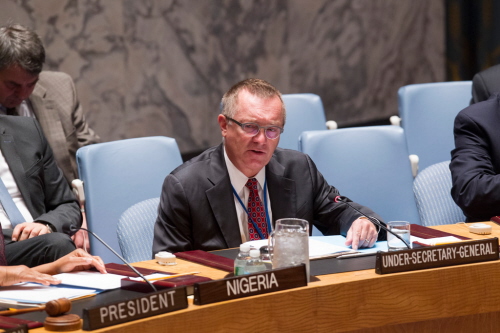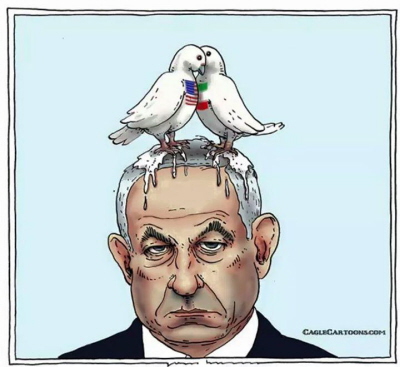Diplomatic degeneration of the yellow spot
The deterioration of sight and hearing radically diminishes our ability to perceive the surrounding world. Deterioration of sight in elderly people often is associated with the so- called Age-related Macular Degeneration (macula lutea -from Latin macula, "spot" + lutea, "yellow"). Initially it causes distorted vision in which straight lines appear wavy, then the loss of vision in the center of the visual field, and finally it can lead to blindness. More and more often we observe such a phenomenon of distortion of vision in international bodies, governments, and formerly respectable organizations which often only pretend that they are defending human rights.
The statement that the UN Security Council is a body in a state of pompous vegetation seems to be a cliché. There is, however, one field where it is exceptionally efficient: it intensively supports the rise of a brown-shirt tide of fascism by a deliberate and organized diverting of the world’s attention from the acts of violence committed by many states, through the ceremonial and constant sewing of a yellow patch on the Jewish state as the world’s pariah which should be the focus of the hatred of whole humanity.
Let’s look at one minor and apparently trivial event in the Security Council’s everyday work. No less than once a month the Security Council is briefed on the situation in the Middle East. The latest such briefing took place on 19August 2015.
The reasons for the frequency of UN Security Council briefings about the situation in the Middle East seem absolutely obvious. After all, this is a region on fire. The number of people killed in Syria is now about a quarter of a million, many more are wounded, and several million have become refugees. War is also going on in neighboring Iraq, where one of the most barbaric organizations of the modern world is raping, torturing, and slaughtering people by the thousand. It has officially established slavery, it is burning churches and mosques, destroying World Heritage national monuments. Financed and armed by Iran, militias are maintaining the state of permanent civil war in Lebanon, are fighting in Syria and Yemen, are perpetrating acts of terror in other Arab states, and are acting against Israel. For years now Iran has been adding fuel to the Sunni-Shia conflict, which strengthens Sunni terrorism – which is strong enough even without it. In Iran itself people from the opposition are tortured and murdered in prisons, gays are publicly hanged in the streets, and religious minorities are mercilessly persecuted. Without any doubt, the Middle East merits the constant attention of the UN Security Council.
The latest report by the Undersecretary General for Political Affairs, Jeffrey Feltman, starts as follows:
Madam President, Members of the Security Council,
I address you at a time when the risk of escalation in Israel and Palestine is palpable. The past month has witnessed unconscionable crimes of hatred by extremist elements, reprehensible retaliatory violence, provocations at Jerusalem’s holy sites, and a worrying increase in rockets launched from Gaza towards Israel.
The coming days will mark the one-year anniversary of the conclusion of last year’s devastating Gaza conflict – a conflict from which the Palestinians of Gaza have yet to recover…
The Undersecretary General didn’t say how many people were killed in Syria last year, probably only because for more than a year the UN has stopped announcing the information about victims in Syria, for the collecting of this information was too difficult. He didn’t inform the UN Security Council about the victims of ISIS, nor about the killed and wounded in Yemen. He didn’t mention the tragedy of the Yazidis and Kurds. The Undersecretary General went straight to a tragedy in a Palestinian village of Duma on the West Bank where an 18-month-old toddler died in a house fire. His father died a few days later and his mother and a four-year-old sibling are still fighting for life.
The Undersecretary General didn’t say that the perpetrators had not been caught, that the only indication that the perpetrators were Jewish extremists was a word in Hebrew written on the wall. The Undersecretary General had no doubt and deftly used the strong reaction of the Israeli Prime Minister, who – in contrast to Palestinian politicians who treat their terrorists as heroes – demanded that the perpetrators of this crime be prosecuted, no matter whether they were Jews or anybody else.
The August brief for the UN Security Council on the situation in the Middle East is 1769 words long, of which 174 words are devoted to the situation in Lebanon and Syria. The name ISIS does not appear; there is no Yemen. Here is what the Undersecretary General had to say about all the rest of the Middle East besides Israel and Gaza:
A few words about the situation in Lebanon and Syria.
In Syria, the air raids by Syrian forces on a market place in the town of Douma, which reportedly killed and injured over 300 civilians on 15 and 16 August, was one of the bloodiest since the conflict started in March 2011. This would be yet one more crime for which those responsible must be held accountable. Hostilities must end and the parties must show genuine commitment to resolving this conflict through an irreversible political transition by engaging in the efforts of the Secretary-General's Special Envoy, as endorsed by the Security Council Presidential Statement.
In Lebanon, political differences continued to hinder the proper functioning of Lebanese state institutions despite Prime Minister Salam’s commendable efforts to run the government. We continue to call on Lebanon’s leaders to act urgently and responsibly by filling the presidential vacuum without further delay. The situation along the Blue Line and in UNIFIL’s area of operations has remained calm, despite Israeli violations of Lebanese airspace on an almost daily basis.
The Undersecretary General never heard about any Hezbollah in Lebanon, nor towns and villages attacked by ISIS, nor Christian and Sunni inhabitants of this country terrorized by Hezbollah.
A month ago a similar report on the situation in the Middle East was presented by UN Special Coordinator for the Middle East Peace Process, Nickolay Mladenov, who started with these words:
“Let me begin by extending my warmest wishes to our Muslim colleagues and their families on the occasion of Eid Al-Fitr and the end of the holy month of Ramadan.” Then he stated that the Israeli-Palestinian conflict is increasingly entangled in the tectonic shifts in the Middle East.
Given the region's massive transformation, it is imperative — perhaps more than ever before — that a permanent settlement be found, based on the concept of two states, Israel and a sovereign, contiguous and viable Palestine, living side by side in peace, security and mutual recognition.
Diplomats in the UN Security Council appear sane; however, they may suffer from a highly advanced degeneration of their yellow spot combined with their chronic need to attach a yellow patch to the Jews, which allows them to notice a distorted Israel peripherally in spite of the total loss of the central vision.
The UN Security Council recently approved and extended the notorious deal with Iran. Until now the most graphic comment on it was given by Switzerland’s Ambassador to Iran, Giulio Haas, who on 27 August 2015 organized a huge conference of Iranian and Swiss businessmen in Zurich. (As is well known, Switzerland, the always neutral virgin, was arguably the greatest beneficiary of the Holocaust.) At the conference Ambassador Haas encouraged everyone to make the most of the opportunities opened by the deal with Iran, and to raise the spirits of the meeting, he showed a picture on a huge screen of two peaceful doves with the flags of Iran and the U.S. defecating on the head of the Israeli Prime Minister.
The Swiss government expressed the hope that nobody was offended by this joke.
The degeneration of the yellow spot in the diplomatic circles of Europe and America seems to grow to terrifying proportions, but the claim that the atmosphere is more and more similar to the 1930s provokes righteous indignation.
(Translation from Polish: Małgorzata Koraszewska & Sarah Lawson)

